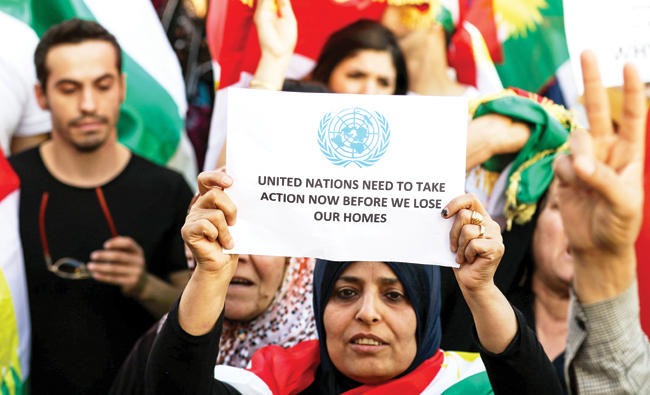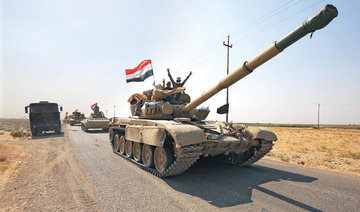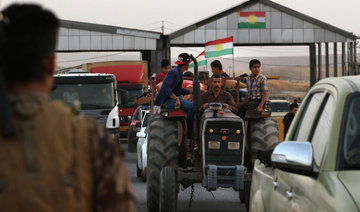BAGHDAD: Iraqi security forces backed by Shiite paramilitaries have seized almost all disputed areas from Kurdish fighters, but have no intention to enter the Kurdish region itself, Iraqi military officers told Arab News on Saturday.
Baghdad launched a military operation last week to drive Kurdish forces out of the northern city of Kirkuk, its lucrative oilfields and all disputed areas next to Iraqi Kurdistan.
Major clashes erupted on Friday when federal troops advanced to retake Alton Kobrai town, the last disputed territory, 40 km northwest of Kirkuk.
Kurdish forces attacked the advancing troops with mortars, rockets and grenades, killing several soldiers and Shiite fighters, military sources said.
“The military operation is almost complete. Small villages and towns in the area are still out of our control,” Ahmed Assadi, spokesman for the Popular Mobilization Units (PMU), told Arab News.
“The operation will end as soon as the troops completely reach the Blue Line (the 2003 agreed border of Iraqi Kurdistan), and we have no orders or intention to cross this line.”
Around 120,000 people have fled Kirkuk and Tuz Khurmatoo in the last five days due to the military operation, Iraq’s Ministry of Migration and Displacement said on Saturday.
In 2014, the Kurdistan Regional Government (KRG) took advantage of the Iraqi Army’s weakness in the face of lightning advances by Daesh to seize territory beyond the Blue Line.
The military operation was launched in response to a controversial referendum held last month by the KRG, in which 92 percent of Kurds voted for independence from Iraq.
Baghdad has demanded the cancelation of the result, and the handover of disputed areas, as preconditions for talks “under the umbrella of the constitution.”
Iraqi presidential adviser Sherwan Al-Waieli told Arab News that KRG President Masoud Barzani cannot represent the Kurdish side in talks because “legally and constitutionally, he hasn’t been president for two years.”
Barzani’s tenure as KRG president ended in 2015, and he has been pressuring the Kurdish Parliament and political parties to extend his term.
The most influential parties — the Kurdistan Democratic Party (KDP), the Patriotic Union of Kurdistan (PUK) and Gorran — shared power until 2014, when Barzani, who heads the KDP, limited the influence of the other two parties after they rejected his request to extend his term.
Last week, it was alleged that PUK leaders forged an agreement with Baghdad to withdraw from all disputed areas under their control without fighting. On Saturday, Gorran urged Barzani to step down to open the door for talks with Baghdad.
“The new government has to represent all the Kurdish parties, contribute to the establishment of security and stability, address economic problems and begin dialogue with Baghdad,” Masoud Haider, a senior leader of Gorran and a federal lawmaker, told Arab News.
“There’s a political and military setback in Kurdistan because of the decisions made by the KDP and PUK over the past two years, and they must bear the consequences.”
Barzani’s position as KRG president “is illegal,” said Haider.
“His term ended two years ago, so he has to step down.”
Iraqi Army: No intention to enter Kurdistan
Iraqi Army: No intention to enter Kurdistan

Mediator Qatar confirms ‘technical meetings’ on Gaza truce ongoing

DOHA: Talks aimed at cementing a truce in Gaza between Israel and Hamas are ongoing, with “technical meetings” taking place between the parties, mediator Qatar’s foreign ministry said Tuesday.
“The technical meetings are still happening between both sides,” ministry spokesman Majed Al-Ansari said, referring to meetings with lower-level officials on the details of an agreement. “There are no principal meetings taking place at the moment.”
Mediators Qatar, Egypt and the United States have been engaged in months of talks between Israel and Hamas that have failed to end the devastating conflict in Gaza.
Ansari said there were “a lot of issues that are being discussed” in the ongoing meetings, but declined to go into details “to protect the integrity of the negotiations.”
Hamas said at the end of last week that indirect negotiations in Doha had resumed, while Israel said it had authorized negotiators to continue the talks in the Qatari capital.
A previous round of mediation in December ended with both sides blaming the other for the impasse, with Hamas accusing Israel of setting “new conditions” and Israel accusing Hamas of throwing up “obstacles” to a deal.
In December, the gas-rich Gulf emirate expressed optimism that “momentum” was returning to the talks following Donald Trump’s election victory in the United States.
A month earlier, Doha had said it was putting its mediation on hold, and that it would resume when Hamas and Israel showed “willingness and seriousness.”
Syrian mayor says Israel collected arms from locals in Golan buffer zone

- Some Syrians seized weapons left behind by soldiers and security personnel, Mreiwel said, with the Israeli army dedicating an area for people to hand over those weapons
QUNEITRA: A Syrian mayor told AFP he had meetings with Israeli officers as the military conducted incursions in his village inside a Golan Heights buffer zone, saying they had demanded locals relinquish their weapons.
The Israeli military, contacted by AFP, said it could not comment.
Mohamed Mreiwel, mayor of the village of Jabata Al-Khashab in Quneitra province, said on Monday that he had met three times with Israeli officials who had asked to see him.
Israel, long a foe of Syria, has launched hundreds of strikes on Syrian military sites since the fall of president Bashar Assad on December 8, destroying most of the army’s arsenal, a war monitor has said.
The same day Assad was toppled by Islamist-led forces, Israel also announced that its troops were crossing the armistice line and occupying the UN-patrolled buffer zone that has separated Israeli and Syrian forces on the strategic Golan Heights since 1974.
Mreiwel said that in his first meeting with the Israelis, “they asked for weapons to be handed over to them within 48 hours.”
Residents of the village, which is located in the buffer zone, had complied with the request, he said.
Syria’s army collapsed in the face of the rebel offensive, with thousands of soldiers, policemen and other security officials deserting their posts.
Some Syrians seized weapons left behind by soldiers and security personnel, Mreiwel said, with the Israeli army “dedicating an area for people to hand over those weapons.”
During his latest meeting with the Israelis on Sunday, “we told them that we no longer had any weapons and that if we had any, we would hand them over to the Syrian government,” said Mreiwel.
He added that he told the Israeli officials that “we are not allowed to meet with you,” as Syria and Israel are still technically at war and do not have diplomatic ties.
Israeli troops have conducted patrols on the main street of Jabata Al-Khashab, an AFP correspondent said.
Israeli tanks are also stationed in nearby Baath City, named for the now suspended political party that ran Syria for decades until Assad’s ousting.
Israel seized much of the Golan Heights from Syria in war in 1967, later annexing the territory in a move largely unrecognized by the international community.
Jordan, Syria to combat arms and drugs smuggling, resurgence of Daesh

DUBAI: Jordan and Syria have agreed to form a joint security committee to secure their border, combat arms and drug smuggling and work to prevent the resurgence of Daesh, Jordan’s foreign minister said on Tuesday.
Western anti-narcotics officials say the addictive, amphetamine-type stimulant known as captagon is being mass-produced in Syria and that Jordan is a transit route to the oil-producing Gulf states.
Jordan’s army has conducted several pre-emptive airstrikes in Syria since 2023 which Jordanian officials say targeted militias accused of links to the drug trade and the militias’ facilities.
“We discussed securing the borders, especially the threat of arms and drugs smuggling and the resurgence of Islamic State. Our security is one, we will coordinate together to combat these mutual challenges,” Jordanian Foreign Minister Ayman Safari told a joint press conference with Syrian Foreign Minister Asaad Hassan Al-Shibani.
Shibani, who was in Amman after visiting Qatar and the United Arab Emirates following the fall of President Bashar Assad, told Safadi that drug smuggling would not pose a threat to Jordan under Syria’s new rule.
“The new situation in Syria ended the threats posed to Jordan’s security,” he said.
Referring to the addictive amphetamine-type stimulant known as captagon, he said: “When it comes to captagon and drug smuggling, we promise it is over and won’t return. We are ready to cooperate on this extensively.”
Israel calls for pressure on Turkiye to stop attack on Kurds

JERUSALEM: Turkiye must face pressure from world powers to stop attacks on Kurds in northern Syria, a senior Israeli foreign ministry official said on Tuesday.
"The international community must call on Turkey to stop these aggressions and killing. The Kurds must be protected by the international community," foreign ministry director general Eden Bar Tal told reporters.
Palestinian health ministry says 2 killed in Israeli West Bank raids

- Israeli troops or settlers have killed at least 820 Palestinians in the West Bank since the start of the war
Ramallah: The Palestinian ministry of health said Israeli forces killed two people on Tuesday in separate raids in the northern West Bank, while the military said it had targeted a “terrorist cell.”
One Palestinian was killed in the town of Tammun, and another in the village of Talouza, the Ramallah-based ministry said.
The Palestinian Red Crescent said its teams had transported the body of an 18-year-old from Tammun who was killed “as a result of shelling,” and that five other people were severely injured during the Israeli raid.
The body was taken to the Turkish Hospital in the nearby city of Tubas, where the director identified the deceased as Suleiman Qutaishat.
The Red Crescent said the other Palestinian was killed in an Israeli raid around the village of Talouza, near Nablus, and was 40 years old.
Residents in the area identified him as Jaafar Dababshe, who they said was shot dead by Israeli forces in front of his house.
The Israeli army when contacted did not offer details, but said on its Telegram channel: “An air force aircraft targeted an armed terrorist cell in the Tammun area” in the early hours of Tuesday.
Violence in the Israeli-occupied West Bank has soared since the war in Gaza erupted on October 7, 2023 after Hamas’ attack on Israel.
Israeli troops or settlers have killed at least 820 Palestinians in the West Bank since the start of the war, according to the Ramallah-based health ministry.
Palestinian attacks on Israelis have also killed at least 28 people in the West Bank in the same period, according to Israeli official figures.
On Monday, three Israelis were killed when gunmen opened fire on a bus and other vehicles in the West Bank, according to medics.
Israel has occupied the West Bank since 1967.
















